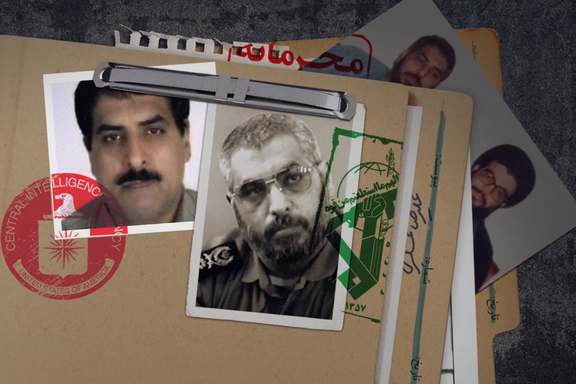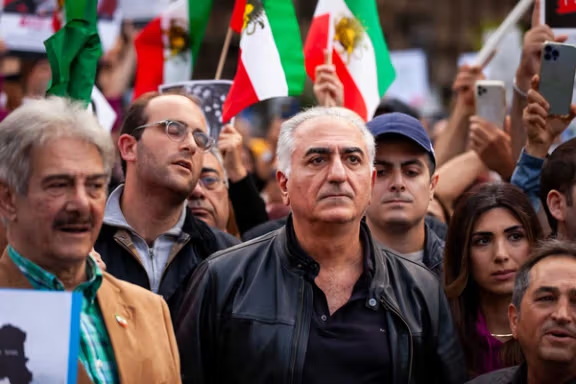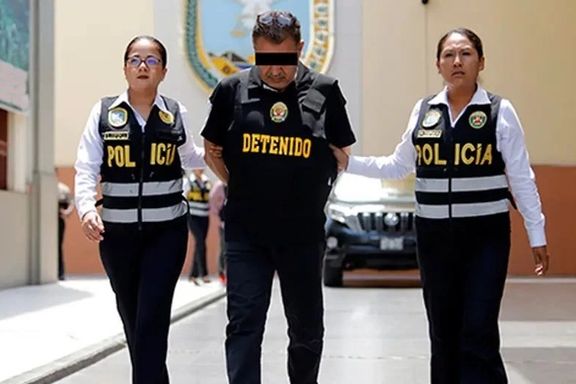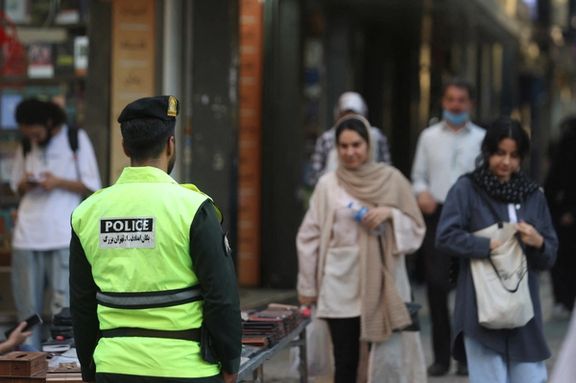Missing IRGC General Alive And Living In US, 17 Years After Defection To West



As much of the global media scrambled to decode where Iranians stand on the escalating tension between Tehran and Jerusalem – Iran’s exiled Prince Reza Pahlavi appeared to be everywhere.
In what can only be described as a kind of media tour, Pahlavi embarked on at least 13 interviews in the span of just 11 days.
From left-wing to right-wing US cable news, German tabloids, UK broadcasters, Russian independent news stations and an Indian news channel – Pahlavi spoke staunchly against the Iranian government’s attack on Israel.
Pahlavi, whose father was the last monarch before the Islamic Revolution in 1979, arguably stood out as the most prominent Iranian figure speaking to the media about the plight and sentiments of Iranians today.
“I think the time has come for the world to make a final decision on the subject,” Pahlavi said on SKY News.
That was the overarching narrative, woven through the plethora of interviews Pahlavi gave this month: The downfall of the Islamic Republic is the only way to bring peace and stability to the Middle East, but, what’s missing is a final decision – or a reset – by the Western world to commit to regime change.
He was asked by multiple anchors whether he sees cracks or weakness in the regime, enabling its downfall, to which he quickly stated “of course”.
Pahlavi further maintained that diplomacy with Iran has failed – and that Western leaders are clinging to futile hope that the regime may change its behavior.
“This is basically kicking the can down the road… Appeasement has failed. Any continuation of the same, frankly, is insanity,” he told The Telegraph.

Pahlavi refused to name specific Western leaders – but had harsh words for the Obama and Biden administrations in other interviews.
Speaking to Indian news anchor Arnab Goswami, Pahlavi said, "If you take the period of time when there was stronger leadership in this country during the Trump administration...between the Obama administration and Biden administration, the number of executions in Iran was half it is today. Why? Because that kind of leadership and strength basically makes such regimes think twice before they do anything – whether it’s at home or abroad.”
But, Pahlavi made sure to disavow any notion that a foreign military attack or intervention would be necessary to help the Iranian people “liberate themselves.”
“Fighting the tentacles is no longer a solution. You have to go for the eye of the octopus, and the eye of the Octopus is Tehran…I am not calling for any foreign military attack or intervention…the natural army in place are the people of Iran," he told Goswami.
Pahlavi emphasized that the Iranian people hold their own destiny in their hands – but, that it would be much easier with the support of the West.
In his step-by-step plan to achieve a revolution, what do Iranian people need, according to Pahlavi?
Internet access, funding to launch labor strikes, and a clear exit strategy for government or military personnel without criminal records, ensuring their place in a future Iran.
Perhaps boldly, Indian anchor Goswami also asked Pahlavi why the Iranian people should believe that he has their best interest in mind.
“That’s very easy to prove. All you have to do is to monitor Iranian social media. All you have to do is look at various polls that have been done about what level of support or popularity I have in Iran,“ Pahlavi said.
Indeed, Pahlavi is often affectionately called Crown Prince by his fervent followers and monarchists who see him as Iran’s future leader, though he himself has often said he is not running for any political office.
“I’m not running for any office or position,” he told the New York Post, “for me, the finish line is the day people go to the polls and finally participate in a referendum to decide their fate.”
While maintaining that he is one of the few – if not the only person – the Iranian people say they can trust, Pahlavi said their faith in him amounts to a political capital that he’s spending on the liberation of his fellow compatriots.
As Pahlavi spoke about his “two-pronged” approach of maximizing sanctions on Tehran, while simultaneously supporting the Iranian people – BBC’s Chief Correspondent Lyse Doucet threw him a curveball.
Doucet prodded that Pahlavi’s position on expanding sanctions puts him “at odds with other leading figures in the [Iranian] opposition” – citing the imprisoned Nobel-laureate Narges Mohammadi’s stance that sanctions “don’t work” and “add pain on millions of Iranians.”
“I totally disagree with that assessment. And the reason you need to, in fact pressure, is because when you ignore that the regime is going to benefit – not the people – then the only way to curtail the regime is, make it less capable to have access to funding,” Pahlavi answered quickly.
Along with a formal terrorist designation for the Islamic Revolutionary Guard Corps (IRGC) by the UK and EU, Pahlavi called for stronger leadership in the West – akin to Roosevelt and Churchill.
Pahlavi’s opponents offline, however, often lament that he is surrounded by extremists, that they don’t want another dictator for Iran – and that he is not entirely transparent about his own plans when it comes to the future of Iran.
So, what has Pahlavi said about his personal plans, if there is a revolution?
“I hope world leaders will finally decide to consider this issue very seriously and I stand ready to present to them our viewpoints, on behalf of my compatriots, of how they can best find a solution that is win-win, which is in the interest of the Iranian people, but also in their own interest,” Pahlavi told English broadcaster and anchor Piers Morgan.
On FOX News, Pahlavi said in the event of regime change, he is there to “provide that kind of interim leadership within a constitutional process that would let the Iranian people to finally decide what they want.”
“Regardless of what the Iranian people do, is it enough for the ultimate change? I always tell my own compatriots, we have to rely on ourselves and nobody else. But, it would be so much easier for us to succeed if we had the actual support from the free world,” Pahlavi told Russian independent news outlet Rain.

A suspected member of the IRGC has been handed 18-months preventive detention over his attempt to assassinate two Israelis in Peru.
Investigations are still underway regarding the motive of the suspect, identified as Majid Aziz, who acquired Peruvian nationality through marriage. His two accomplices Ángelo Trucios and Walter Loja, both Peruvian nationals, have received the same sentence.
“It has been established with a high degree of plausibility” that the three suspects had conspired to kill Israelis, ruled the Peruvian judge in charge of the case.
According to the prosecutors, Azizi contacted the Peruvians to plan to kill two Israeli citizens living in the city of Cusco, once the capital of the Inca Empire. One of the Israeli targets works as a tour guide and the other owns a café.
Azizi was apprehended in March after he withdrew money from the Interbank bank, located in the Plaza de Armas in the center of the capital Lima. According to reports at the time, he was arrested over plotting to carry out a terrorist attack at the Asia-Pacific Economic Cooperation Forum (APEC).
The conspiracy in Peru is one of several Iran-backed attempted attacks over the last year on Jewish or Israeli targets, either carried out or foiled, in countries including Greece, Azerbaijan and Cyprus.
Over the past two years, many Iranian political activists and opposition figures have urged Western countries to designate the IRGC as a terrorist organization over its role in suppressing dissent in Iran and orchestrating attacks abroad.

One hundred political prisoners and activists lambasted Iran’s latest crackdowns on mandatory hijab, branding it “hostile insistence on homogenizing people’s lifestyles”
Iran’s streets are once again the scene of the government’s 'military campaign against oppressed, enlightened and courageous women of the country', said the signatories of the statement, further adding that the government’s policy of enforcing compulsory hijab with force is simply an instrument to intimidate dissenters.
At a time when a war looks to be brewing and when systemic mismanagement and corruption in government have made life miserable for Iranians, Iran has decided to wage a war at home against people in the streets, the statement claimed, signatories including Nobel Peace Prize laureate Narges Mohammadi.
On April 13, Iran launched its first ever direct offensive against Israeli territory with more than 350 drones and cruise and ballistic missiles, 99% of which were downed by Israel and a US-led coalition, according to the Israeli army. Through its proxies, Iran has also been targeting US facilities in the Middle East and international shipping in a joint effort since October 7 when Iran-backed Hamas in Gaza invaded Israel, triggering the longest Gaza war since the terror group took over the strip.
On the same day as the aerial assault, the Iranian government started to implement its new plan – called Project Nour – to crack down on women who defy compulsory hijab. Activists and observers contend that the coincidence of the two events is no accident and that the regime intends to quell any kind of dissent, including anti-war voices, under the pretext of hijab enforcement.
Former political prisoner Abolfazl Ghadiani (Qadiani) called Ali Khamenei a “power-worshipping tyrant” on the back of the new policies, saying Iran’s Supreme Leader has dispatched his forces to the streets to suppress women as he fears a likely revival of the “Woman, Life, Freedom” movement of 2022. The uprising, sparked by the death in morality police custody of Mahsa Amini, has led to the greatest challenge to the theocratic dictatorship since the founding of the Islamic Republic in 1979.

Calls for action grew louder in Iran on Wednesday, following an announcement that Iranian rapper Toomaj Salehi has been sentenced to death for supporting anti-regime protests in 2022.
Thousands expressed their outrage on social media, proposing a day of action across the world, something that has not happened for a while. There were also reports from Tehran of night-time chants against the regime, as well as youngsters writing slogans on city walls in support of the increasingly popular artist.
Toomaj Salehi broke out of the underground rap scene in Iran with his 2021 single, Rat Hole [surakh mush], in which he attacked those Iranians – inside and outside Iran – who choose to side with the regime or not to use their platforms to augment or relay the voice of struggling and dissenting Iranians. He became a household name and a symbol of heroic resistance after he joined protesters in 2022, despite clear and imminent danger to his life.
He was first arrested in October 2022 at the height of the protests better known as Women Life Freedom movement –that was sparked by the death of a young woman (Mahsa Amini) who was arrested because the police didn’t like her outfit, and was beaten on the head while in custody.
In July 2023, Toomaj was sentenced to 75 months in prison, after Iran’s Supreme Court effectively ruled out a death sentence. He was released on bail in November, more than a year after he was first arrested. A few days after his release, he published a video message, detailing his mistreatment and torture by intelligence agents of the regime. He was rearrested almost immediately.
In January, Isfahan's Revolutionary Court ignored the higher court’s ruling for clemency and brought new charges against him, according to his lawyer, Amir Raeisian. It is for those new charges, chief among them 'baghy' (or armed rebellion), that Toomaj has been sentenced to death.
His sentence has been met with a mix of shock and anger – from Tehran and Isfahan to Berlin and Washington D.C.
“We strongly condemn Toomaj Salehi’s death sentence and the five-year sentence for Kurdish-Iranian rapper Saman Yasin,” US special envoy on Iran Abram Paley posted on X. “We call for their immediate release. These are the latest examples of the regime’s brutal abuse of its own citizens, disregard for human rights, and fear of the democratic change the Iranian people seek.”
Many Iranians view with suspicion the Biden administration and its messages of support, having witnessed its efforts to reach a deal with what they see as a brutal government that has lost legitimacy to rule.
The death sentence handed to Toomaj Salehi comes amid heightened tensions abroad and renewed crackdown on women inside. It could thus be read as yet another attempt by the regime to say it is in charge and as determined as ever to suppress all forms of dissent.
“Since its inception, the Islamic Republic has waged war on artists, particularly those who have used their talents to advocate for Iran’s liberation,” Iran’s exiled prince Reza Pahlavi posted on X. “I call on the international community, particularly Toomaj’s peers in the arts, to be his voice and to demand an immediate revocation of this sham sentence and his unencumbered release from prison.”
Toomaj Salehi and his defense team have 20 days to appeal against the ruling –and they will, according to his lawyer, Amir Raesian.

Two weeks into the latest round of violent crackdowns on Iranian women refusing to wear the hijab, certain so-called reformist and moderate politicians and commentators are cautioning the state about its harsh approach.
At the same time, some female journalists assert that the crackdown is part of the regime's ongoing strategy to stifle dissent, by reinforcing the ideological pillars of the Islamic government.
Mohammad Javad Azari Jahromi, the country’s former Communications Minister, said "although hijab may be a rule Allah wants to be enforced, yet it cannot be over and above the very essence of religion which is based on monotheism."
Writing on his Telegram channel, the former Minister stated that "as the holy prophet and other Muslim saints have stated, the rules of Islam cannot be established by using force against Muslims.”
Jahromi also criticized the government for not taking any lessons from the failure of previous rounds of crackdowns on Iranian women.
Notably, Jahromi – a former intelligence officer – was sanctioned by Western countries, including the US, for being a key player in the Iranian “regime’s censorship and surveillance campaign, which intensified in the wake of anti-regime protests” in 2019.
Jahromi made the statement prior to Mehdi Fazaeli, a member of Supreme Leader Ali Khamenei's Office, informing reporters on Friday that Khamenei had warned certain Iranian officials about their inappropriate approach to hijab enforcement.
This month, multiple reports show that the state’s so-called morality police and other entities have once again escalated the violent enforcement of the mandated Islamic hijab, after Khamenei called for strict measures against women.
Female Iranian journalists, including Roya Karimi Majd, have meanwhile highlighted that the violent treatment of women may have been an attempt to suppress potential dissent in Iran.
Quoting reports that said more Iranians paid attention to the news of the crackdown on women than those who reacted to the news of tensions between Iran and Israel, she wrote on X: "Is the Islamic Republic trying to distract Iranians' attention from the tensions with Israel by the widespread crackdown on women? This is a show of power in the streets to scare all those who might think of an anti-war demonstration! Women are being beaten up so that other protesters take a lesson."
In an article on Iran International’s Persian-language website, gender studies researcher Zahra Bagheri Shad stated, "Ali Khamenei has described defying hijab as a politically haram [prohibited] issue. That is because women who defy the compulsory hijab are the most powerful; social force to defeat regressive elements. Despite repeated harsh crackdowns, Iranian women will not put a step back."
Cleric Mohammad Ali Abtahi who was so-called reformist President Mohammad Khatami's Chief of Staff in the late 1990s and early 2000s warned hardliners "to be mindful of unity in the country rather than suppressing women at a time a war is going on between Iran and Israel”.
"Although revolutionaries across the globe praised Iran for its direct confrontation with Israel, the news of the violent crackdown on women in the streets of Iran only made Israel and other opponents of the Islamic Republic happy," Abtahi said.
He stressed that the crackdown on Iranian women undermined Iranians’ pride world over as a result of the massive drone and missile attacks on Israel.
In 2003, while Abtahi served as Vice President, Iranian-Canadian journalist Zahra Kazemi was raped and tortured by Iranian officials at Tehran’s Evin Prison, ultimately succumbing to her injuries. After days of denial by the government, Abtahi conceded that Kazemi died as a result of being beaten.